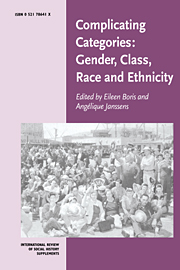Book contents
- Frontmatter
- Contents
- Notes on Contributors
- Complicating Categories: An Introduction
- Family Concerns: Gender and Ethnicity in Pre-Colonial West Africa
- Narratives Serially Constructed and Lived: Ethnicity in Cross-Gender Strikes 1887–1903
- Competing Inequalities: The Struggle Over Reserved Legislative Seats for Women in India
- “The Black Man's Burden”: African Americans, Imperialism, and Notions of Racial Manhood 1890–1910
- Sex Workers or Citizens? Prostitution and the Shaping of “Settler” Society in Australia
- From Muscles to Nerves: Gender, “Race” and the Body at Work in France 1919–1939
- “Blood Is a Very Special Juice”: Racialized Bodies and Citizenship in Twentieth-Century Germany
Sex Workers or Citizens? Prostitution and the Shaping of “Settler” Society in Australia
Published online by Cambridge University Press: 14 January 2010
- Frontmatter
- Contents
- Notes on Contributors
- Complicating Categories: An Introduction
- Family Concerns: Gender and Ethnicity in Pre-Colonial West Africa
- Narratives Serially Constructed and Lived: Ethnicity in Cross-Gender Strikes 1887–1903
- Competing Inequalities: The Struggle Over Reserved Legislative Seats for Women in India
- “The Black Man's Burden”: African Americans, Imperialism, and Notions of Racial Manhood 1890–1910
- Sex Workers or Citizens? Prostitution and the Shaping of “Settler” Society in Australia
- From Muscles to Nerves: Gender, “Race” and the Body at Work in France 1919–1939
- “Blood Is a Very Special Juice”: Racialized Bodies and Citizenship in Twentieth-Century Germany
Summary
INTRODUCTION
The history of prostitution, defined as the commercial exchange of sexual services, provides a fertile ground for the study of the intersections between gender, race and class. Obviously, the sale of sexual labour has implications for constructions of gender, although the specific implications may change with time. Commercial sex offers particularly sharp insights into the ways in which gender considerations intersect with class and race because of the physical intimacy and potential for procreation involved in the sex act. Prostitution literally forces societies to come face to face with their assumptions about and attitudes to class and race hierarchies and relationships. The Australian case is especially useful for studying these relationships because of the imbalance in the ratio of men to women which has characterized colonial society generally and certain types of communities in particular, and the ways in which this imbalance affected some classes and ethnic groups more than others. Colonial Australia also provides a complex tapestry of ethnic/racial issues because it included divisions not just between “white” settlers and indigenous Aborigines, but also between both of these groups and various groups of immigrant, “coloured” workers. In the twentieth century, when demographic patterns became more balanced in gender terms and more homogenous in racial terms, the international sex industry continued to be important because it played a part in Australia's quest for recognition as an independent member of the community of “civilized”, white, nations.
- Type
- Chapter
- Information
- Complicating Categories: Gender, Class, Race and Ethnicity , pp. 101 - 122Publisher: Cambridge University PressPrint publication year: 2000

